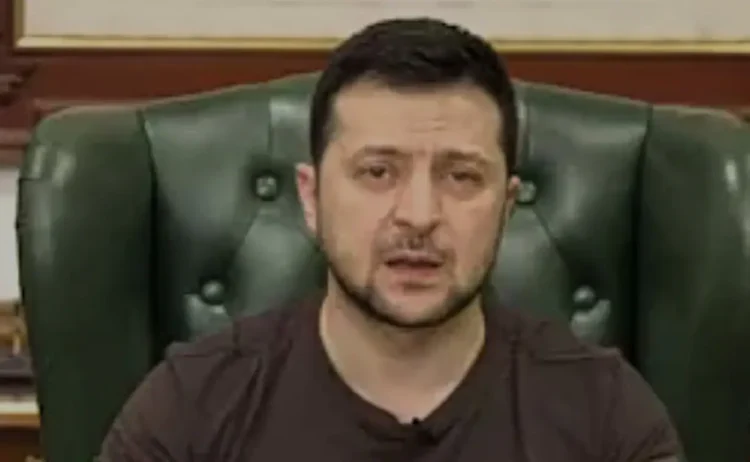By Isabelle Wilson-
Russian troops cut power and water to millions of people in eastern Ukraine in revenge for Kyiv’s lightning counteroffensive, Ukrainian President Volodymyr Zelensky said.
Ukraine accused the Kremlin’s forces of deliberately targeting civilian infrastructure in Kharkiv and Donetsk regions after they were driven to abandon their strategically important stronghold in Izium over the weekend.
The news comes after the Ukrainian military had allegedly retaken more than 1,160 square miles of territory since the onset of its blitz counter-offensive in late August.
Ukrainian officials said the targets of the retaliatory attacks included water facilities and a thermal power station in Kharkiv, and that they caused fires and widespread blackouts.
Kharkiv Mayor Ihor Terekov said Russian attacks on critical civilian sites plunged much of Ukraine’s second-largest city into darkness and deprived its inhabitants of running water on Sunday night, but the power has since been partially restored.
Ukraine’s general staff alsosaid its soldiers had recaptured more than 20 towns and villages in just the past day.

Russians accused of attacking Ukranian civil infrastructure
The governor of the nearby Sumy region said more than 130 settlements were without power.
Frefighters in Kharkiv battled blazes and emergency staffer were busy repairing damaged utilities to restore power.
In a fiery social media post on Sunday, Zelensky accused Russia of committing “terrorist acts” by directing “deliberate and cynical missile strikes” at civilian infrastructure.
A defiant Zelensky went on to state that if given a choice between being without gas, light, water and food, or being without Russian occupiers in their land, Ukrainians will always choose the latter.
“Did you really not understand anything, didn’t understand who we are?” the president added. “Cold, hunger, darkness and thirst – for us are not as scary and deadly as your ‘friendship and brotherhood.’”
In the end, he exclaimed: “We will be with gas, lights, water and food … and WITHOUT you!”
The General Staff of the Armed Forces of Ukraine said Monday that its troops had liberated more than 20 settlements within the past day, pushing Russian forces back to the northeastern border.
“In some areas of the front, our defenders reached the state border with the Russian Federation,” said Oleh Syniehubov, the governor of the northeastern Kharkiv region.
Over the weekend, the Russian Defense Ministry said troops would be pulled from two areas in that region to “regroup” in the eastern region of Donetsk.
After months of little movement on the battlefield, Kyiv’s sudden momentum has lifted Ukrainian morale and provoked outrage in Russia, including unusual public criticism of President Vladimir Putin’s war.
Russian military bloggers and patriotic commentators slammed the Kremlin for failing to mobilize more forces and take stronger action against Ukraine.
On Saturday, the same day Russian forces allegedly retreated from the key logistical hub of Izium, Putin attended the opening of a new Ferris wheel in Moscow.
The power grid in eastern Ukraine came under fire after Ukrainian forces routed Moscow’s troops, forcing them to retreat. Ramzan Kadyrov, the Moscow-backed leader of the Russian region of Chechnya, publicly criticized the Russian Defense Ministry for what he called “mistakes” that made the Ukrainian blitz possible.
Even more notable, such criticism seeped onto state-controlled Russian TV.
“People who convinced President Putin that the operation will be fast and effective … these people really set up all of us,” Boris Nadezhdin, a former parliament member, said on a talk show on NTV television. “We’re now at the point here we have to understand that it’s absolutely impossible to defeat Ukrainerces and colonial war methods.”
Many anti-government politicians have fled the country. Some have been sentenced to prison terms for publicly criticizing Russia’s invasion of Ukraine.
Although Mr. Putin has dominated Russian politics for more than two decades, he has long used elections that carry a veneer of competitiveness to try to legitimize his rule. And while the elections are often rife with fraud, they typically offer an opening for the political opposition to express discontent.
In some instances, especially at the relatively low level of municipal councils, candidates who have been critical of the Kremlin were able to get elected. And on Monday, already-serving municipal deputies from 18 councils in Moscow and St. Petersburg signed a petition calling on Mr. Putin to resign.
Mr. Putin’s grip on Russia’s political system has held largely because of his policymakers’ ability to maintain relative economic stability. The elections this weekend were an early test of whether the economic upheaval caused by Western sanctions stemming from Mr. Putin’s invasion of Ukraine has had an effect on voters.
They took place in the climate of almost total censorship of the mainstream press, making it hard to gauge people’s true attitudes toward the government. Following the invasion in February, Mr. Putin tightened media laws, forcing the few remaining liberal news outlets to shut down.
The campaigning and voting periods were marred by multiple violations, according to a report by Golos, a Russian elections watchdog, which cited official intimidation of election observers and unequal access to state media for opposition candidates.
The report called the elections “unfree and unequal,”saying that “it is impossible to determine the real will of the voters under these conditions.”

